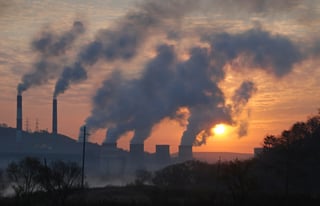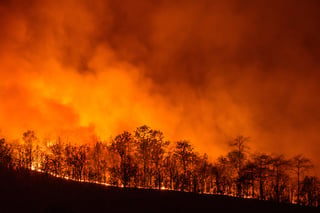What is Climate Change?
Here on earth, we burn fossil fuels at a rapid rate. From the burning of these fuels, carbon dioxide is released and builds up in our atmosphere. The buildup causes the Earth’s temperature to rise, which changes our air quality for the worse. There are some that believe that human intervention has nothing to do with climate but no matter what the cause, sea temperatures are rising causing extremes in weather.
Allergen Increase
Higher temperatures on Earth lead to increased allergens and other irritating air  pollutants. What this means for your COPD is longer pollen seasons, which will increase allergic and asthmatic episodes, making it even more difficult to manage your symptoms.
pollutants. What this means for your COPD is longer pollen seasons, which will increase allergic and asthmatic episodes, making it even more difficult to manage your symptoms.
- Cover your mouth and nose if you’re going somewhere where there are particulates in the air or if it’s a particularly windy day.
- Try to do outdoor activities earlier in the morning when pollen counts are low.
- HEPA air filters can be installed in the ducts of your homes heating system and portable air filters are also available. These filters can clean the air inside your house and decrease respiratory irritants in the air.
Increased Pollution Levels
An increase in smog at lower levels will cause many health problems affecting your  COPD. Diminished lung function will lead to increased hospitalization and more expensive trip to the emergency room for exacerbated COPD symptoms.
COPD. Diminished lung function will lead to increased hospitalization and more expensive trip to the emergency room for exacerbated COPD symptoms.
- If your city is especially polluted, stay inside on high pollution days.
- Download an app on your phone or tablet that tracks pollution. Many newspapers or local news channels report on pollution levels in the morning as well.
- www.Airnow.gov is a tool to help you quickly see what the air quality is like in your area.
- If the air quality is low, limit your activity that day and combine errands if you must go out.
Drought and Wildfires

Wildfires will increase due to climate change, making the quality of the air in those areas very poor. Smoke exposure increases COPD symptoms, such as sudden onset respiratory illness, and will increase your chances of being hospitalized with pulmonary and cardiovascular problems.
- If a wildfire breaks out in your area your best bet is to evacuate if that’s an option.
- If that’s not an option, stay indoors.
- Be sure that your air conditioners are set on recirculate.
- Don’t hesitate to seek medical attention if wheezing or shortness of breath occurs.
- After the fire mop and wipe surfaces with a damp sponge to reduce airborne particulates.
Temperature Extremes
Extreme cold and heat are known exacerbation triggers. For those that live in parts of the country that experience drastic weather changes, outdoor activity may be somewhat limited during certain times of year.
country that experience drastic weather changes, outdoor activity may be somewhat limited during certain times of year.
- On particularly hot and humid days stay inside in a temperature controlled space.
- If you must go out, do it during the early morning or evening hours when temperatures are more moderate.
- Breathing in cold air can trigger an exacerbation. Keep your nose and mouth covered if venturing outside, even just for a short time.
How You Can Help
There are sensible steps you can take to help protect your health and safety as the climate changes. By reducing the amount of carbon dioxide we emit, there will be less heat trapped in our atmosphere. Exercise can decrease the symptoms of COPD, so as much as your body allows you can bike or walk. If that is not possible, public transportation is an excellent option.
Conclusion
Whether you believe in climate change or not, the above information will help you better manage you COPD. It takes many little changes to initiate big changes. Be an advocate for your COPD and educate others on what they can do to help limit the production of carbon dioxide. Educate yourself on how your actions can not only make a difference for you and your COPD, but also help improve air quality for all humankind. After you learn something, share it with friends and family and encourage them to educate others. Be the change you want to see in the world and your world will change for the better.




